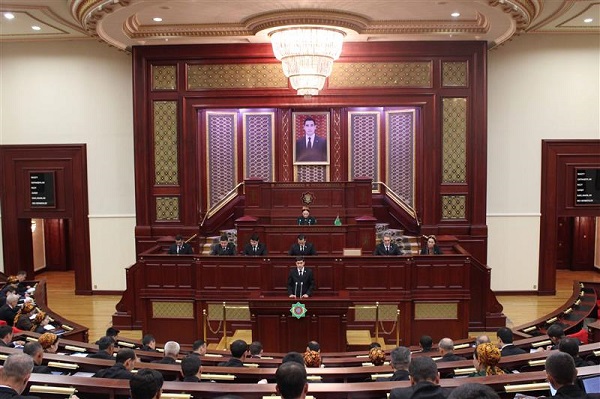On 28 June 2025, the ninth session of the Mejlis of Turkmenistan of the seventh convocation took place, marking a significant milestone in the development of the country’s legislative system. During the session, several draft laws, developed in line with the priorities of state policy, were reviewed and adopted. The session was attended by representatives of relevant ministries, agencies, and mass media, highlighting the transparency and collaborative nature of the legislative process.
The key event of the session was the adoption of the Law of Turkmenistan “On the Approval and Implementation of the New Edition of the Civil Code of Turkmenistan.” This step represents a crucial stage in modernizing the country’s legal system to align with contemporary economic, social, and international realities.
The Civil Code of Turkmenistan was first enacted in 1998 and came into effect on 1 January 1999. Its adoption was a landmark event, ushering in a new era of market democracy and privatization. The Code established fundamental principles such as the equality of all forms of ownership, equality of participants in civil-legal relations, and freedom of contract, laying the foundation for a market-oriented legal system.
Over more than a quarter-century, independent and neutral Turkmenistan has undergone several stages of development. The country’s active integration into the international community in political, economic, legal, and other spheres, along with the growth of a market economy, entrepreneurship, and business, as well as the expansion of human rights and freedoms, has highlighted the need to modernize the Code to meet contemporary realities.
The new edition of the Civil Code was developed with the participation of experts from Germany, ensuring the incorporation of international experience. The work was guided by the objectives outlined by President of Turkmenistan Serdar Berdimuhamedov in his keynote speech at the first session of the Mejlis of the seventh convocation. The updated Code integrates Turkmenistan’s experience gained over years of independence, globally recognized norms of international law, and best practices from other countries.
Yagmyr Nuriyev, Director of the Institute of State, Law, and Democracy of Turkmenistan and Doctor of Legal Sciences, noted that the new edition of the Code ensures clarity and accessibility of the terms and concepts used in its general provisions. Efforts were made to clarify general provisions in specific chapters of the Code and related special legislation, as well as to establish clear rules for their application.
A significant innovation is the inclusion of a dedicated section on international private law, aimed at harmonizing Turkmenistan’s legislation with international norms and facilitating the regulation of relations involving foreign citizens and legal entities.
The new edition of the Civil Code introduces several significant changes reflecting modern legal and economic realities. The terms used in the Code are defined in accordance with national legislative practices, with their content fully elaborated. The structure of sections, chapters, and articles has been aligned with the Law of Turkmenistan “On Legal Acts.” The Code’s provisions have been modernized in accordance with the Constitution of Turkmenistan and current legislation.
The Code regulates a wide range of civil-legal relations, including:
– Entrepreneurial activities and bankruptcy of individuals.
– Legal capacity, majority, and property rights of citizens.
– Guardianship and trusteeship.
– State registration of civil status acts.
– The right to establish public associations and foundations.
– Property rights, including neighborly rights, pledges, and mortgages.
– State registry of rights to immovable property.
– Obligatory and contractual law.
– Intellectual property rights.
– Insurance and banking services.
– Debt obligations and compensation for damages.
– Lease, inheritance, and other relations.
Additionally, the Code includes a new chapter regulating charitable activities, underscoring Turkmenistan’s commitment to fostering social responsibility and civic engagement.
The adoption of the new edition of the Civil Code of Turkmenistan, developed in accordance with the Constitution and international legal norms, represents a significant step in improving the legislative framework for civil-legal relations. The Code strengthens the legal foundations for regulating relations involving foreign persons or elements, contributing to Turkmenistan’s further integration into the global legal and economic community. ///nCa, 30 June 2025
